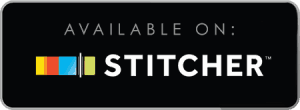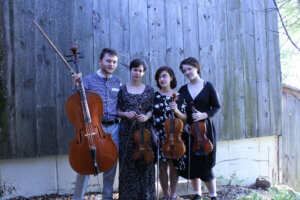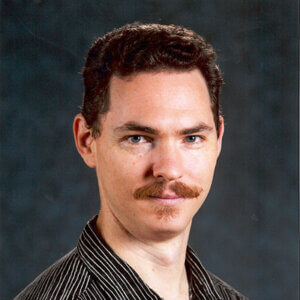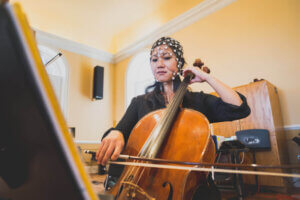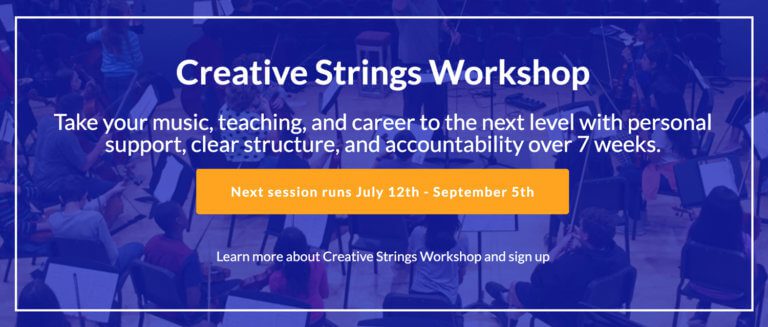Table of Contents
On Today’s Episode…
Join us with Guest Speakers Caleigh Drane & William Seiji Marsh as we discuss how to conquer your stage fright and better achieve your musical goals through mindfulness and mindful practice.
Have you ever practiced and practiced something only to get up on stage and mess it up terribly anyways? I know I have.
When this happens, our first instinct can be to assume that if we’d just practiced more we could have avoided it.
So for the next gig, we practice and practice and practice even more, maybe even to the point of wearing ourselves down physically trying to fit it all in.
And then it happens again.
If this sounds like a cycle that you’ve been locked in before, then you’re really going to want to check out this episode with Caleigh Drane & William Seiji Marsh. We’ll talk about how to get into the right mindset so that you’re practicing better not more.
Our discussion includes...
- Why musicans choke when performing (1:28)
- How to fix our mindset and be present when fear is happening (4:39)
- Bringing your attention to what you’re noticing around you (7:30)
- Beginning the practice warmup of “mindful playing” (9:46)
- Breaking down the mindful playing exercises: (11:54)
- Random note exercise w/ a metronome, focusing on atonal individual notes of different rhythmic values
- Harmonic exercises, playing songs with only specific harmonic intervals
- How musical practice is like yoga- the importance of stretching but not overstretching (16:10)
- How to slow build confidence and tempo on a tune (16:51)
- The limitless ways to practice and master music (20:46)
- Taking steps to the action (where you want to get to) (23:50)
- How to define concrete, actionable goals. (24:48)
- Taking the necessary steps to achieve that goal(30:08)
- letting go of the how the process of achieving a goal comes about (31:37)
- “We relate to how we feel about it, we don’t relate to what’s actually there.” 32:44:00
- The value of envisioning and writing about future goals as if they’ve already been accomplished. (32:51)
- The difference between manifesting and making concrete goals (37:44)
0:00:00.5 Christian Howes: Okay, coming live from… Not live, but doing this interview live in Los Angeles. I’m at my brother’s place, Lewis House, but I’m so glad before I’m flying out after being out here this week to meet up with my old friend, Caleigh Drane, a wonderful cellist, and her fiance William Seiji Marsh. And I had met William… Well, I didn’t meet… I just met him today, but I learned about his Facebook group, which was called Musical Being or something like this.
0:00:37.0 William Seiji Marsh: Yes.
0:00:37.4 Caleigh Drane: Yes.
0:00:37.7 Christian Howes: Musical Being. And I don’t even know if the Facebook group is still alive, but if you go to musicalbeing.com, that’s where he kind of resides on a lot of his thoughts. But I had really connected with your ideas, and so when I talked to Caleigh I was like, “Oh, we got to get William over here so we can do this interview.” But it’s gonna be exciting. We’re gonna talk about some subjects that are really on my mind a lot lately, which is about overcoming performance anxiety, if you choke during performances or if you’re self-judgmental about your playing. If you always feel like I need to get better, if that’s like constantly bothering you. We’re also gonna about… Hopefully talk about practice, practice methodology, and some really interesting ideas. I know it’s gonna be great. And Caleigh may share some ideas. Maybe, if you don’t mind, William, just sharing like yeah, how did you get into this?
0:01:35.3 William Seiji Marsh: Yeah, thank you. Thanks, Chris, for having me. So I got into this… Well, I think my first… Dipping my toe first into it was when I was in college. I studied music at the University of Oregon. I got a degree in Jazz Studies, I’m a guitarist. And one thing I was really struggling with was playing in a way where I could actually express myself and not choke. Like I would go into a tune, if I knew that I had a solo in the tune, this [0:02:04.6] ____ would start and immediately my heart would start racing, and it would just compound up until the solo started, and I’d go right out of the gates trying to impress people and then about three-quarters the way through when you should be hitting that peak it’s like I’m crashing and burning and just surviving the rest of the solo. And I just something had to give. Something had to change for me. And I did what I did, whatever I did get beyond that, and I took all of that work and I’ve been… I’ve kind of packaged it in a way where I can actually deliver it to somebody else and have them get that same methodology and have those same results, so in being self-expressed when you’re improvising, or playing whatever, even if you’re playing something that’s written, being expressive with it. Having practice methodology that’s actually effective towards what you want, feeling like you’re not… Making music from a place of creating and expressing rather than surviving or having people be impressed by what you have to play.
0:03:17.6 Christian Howes: Yeah. So how… That happens to me a decent amount of time, if I’m being honest. If I’m on the bandstand with people that I’m really comfortable with, or if I’m playing music with my kids, then I feel that there’s like a certain flow. It’s easy, right?
0:03:37.6 William Seiji Marsh: Yeah.
0:03:37.8 Caleigh Drane: Yeah.
0:03:38.1 William Seiji Marsh: There’s love there. You know there’s love, there’s trust, yeah.
0:03:42.4 Christian Howes: And also like I’ve… Well, also you could say if you’re playing with your students then you might feel confident. You just feel confident because you feel like you’re two steps ahead of them in some way. But then if I go to play with people I’ve never met before, and it’s a performance situation, sometimes I find myself doing exactly what you described. So I just feel like I have to say it again, it’s like all this energy is kind of building up and you’re feeling like, “Oh, I got to do a good job. I got to do a good job.” And so you just go, boom, right? And you’re not listening. This is I’m talking about in a jazz situation. You’re trying to force. You know me. [chuckle] I’m trying to force it.
0:04:25.1 William Seiji Marsh: Me too just to say, yeah.
0:04:26.1 Caleigh Drane: Yeah, me too.
[chuckle]
0:04:26.6 Christian Howes: Yeah, and so it’s harder to leave space, it’s harder to just wait to feel something and play when it comes from my heart, but it’s more like coming from this wrong place. So I’m really interested in that. So how do you fix that?
0:04:42.8 William Seiji Marsh: Well, I think, actually, one is like getting that there’s nothing to fix, right? Because we’re human beings, and as human beings, we feel fear in the same way that our ancestors might have felt fear when they saw saber-toothed tiger or the same way you might feel when someone screams by you on the freeway, like, “Whoa, what was that?” We have fear, and we just experience it. That’s the way it is for human beings. Now, I think the trick is to distinguish when that fear is popping up in a situation where it’s not really necessary, like on the bandstand it’s not necessary. No one’s gonna die. I mean, hopefully. You’re not… No one’s gonna, you’re not in physical danger, right?
0:05:30.3 William Seiji Marsh: But we still have the same visceral reaction as if somebody were threatening our lives. And if you can distinguish that it’s happening, then you actually have a fighting chance at moving it, transforming it, changing it, and dealing powerfully with it, but a lot of times it’s just we go, “Well, that’s just the way it is I guess. That’s just the way performance is for me.” And so we don’t even consider that there’s an alternative. So I’d say, really, the biggest step is getting present to when it’s happening, and getting present to the physical sensations that really cue you into it. For me, for example, I get hot in the face, my shoulders tense up, my chest gets kind of tight. I feel it happening right now as I’m talking about this, right, being in an interview… And recognizing that it’s there, and getting in the practice of giving it up. Getting in the practice of…
0:06:32.1 William Seiji Marsh: Maybe it’s getting the practice of bringing music into that space of calm, as opposed to practicing music from a space of anxiety, and I have it that a lot of us are in this practice where we relate to music in this world of better than, worse than, good enough, not good enough, slaying, killing or not killing, or whatever. And that’s the world that we exist in. But all of that is completely made up, the music is just the music, and we create all this meaning around it and attach all of this story around it. So what would it look like to just not be in that conversation at all? And just not even paying that attention to it, and I think for a lot of us, it takes actually re-programming ourselves to be in the practice of music that is outside of that conversation. So I don’t know if there’s anything to fix again, it’s just like, “Well, what would it look like to just completely transform the environment in which music is taking place for you?”
0:07:30.9 Christian Howes: So what comes up for me is like, well, you said we have to de-program ourselves. So what comes up for me is, a lot of times in my group classes, I’ll give people guided practice sessions where I’ll ask them to do structured improvisation, which allows me to be… To have students at various… Very different levels. Let’s say like, if you’re a beginner play half notes, if you’re advanced play 16th notes, but here’s a groove and you play within this format, whatever, which is within your current ability. And which is pretty cool in and of itself.
0:08:09.7 William Seiji Marsh: Yes, I love that. I love that. That’s awesome.
0:08:11.9 Christian Howes: Because it allows you to work with a lot of different people and sort of let them set where they’re at and push their levels, but… So a lot of times what I’ll do in these group classes, I’ll be like, “Okay, play whole notes right here, so there’s a loop, it’s like play two, three, four, play again. And then as you’re playing… ” They’re just playing over and over, right? Or maybe they’re improvising their choosing between a couple of notes, but it’s easy, it’s within their level. And it’s a very low pressure environment ’cause it’s not the stage. But I’ll say, “So as you’re doing that, bring your attention to what are you noticing, like listen to the note, but don’t feel the pressure to do anything with the note, like play with no vibrato, play with some vibrato.” And so I guess it’s kinda like mindfulness. I don’t know, that’s…
0:09:00.1 William Seiji Marsh: Yeah. No, I’ve…
0:09:00.3 Christian Howes: I’m learning about mindfulness, but how… What do you… Is this kind of on the track or how do you do it?
0:09:04.5 William Seiji Marsh: I’d say like mindfulness is one is like being aware of it and being aware of what’s showing up, that’s the mindfulness part of it, right? The awareness of what’s showing up physically, mentally, emotionally, as you’re playing. And that’s one component of it. And I think that’s actually, that’s the foundation, like you have to be aware to change anything, like you can’t… If you don’t know if something exists, then you don’t… Then you have no power over it at all, right? So by identifying it, you’re creating it, you’re putting a circle around it, you’re saying “Well, everything that’s inside here is anxiety and everything that’s not inside this circle is not anxiety, and you can actually manage that one thing.
0:09:45.0 Caleigh Drane: Can I share a little bit?
0:09:46.7 William Seiji Marsh: Yeah.
0:09:47.7 Caleigh Drane: So I’ve worked with Bill and really on the court, how this has really transformed my playing, what you guys are talking about here, is Bill helped me reconstruct a warm-up session to begin the practice of mindful playing. And it’s very simple, and it feels completely counter-intuitive based on how many typically complicated thoughts we have around playing right? So the warm-up was a simple scale, and for me to just be present, the game is really to be as relaxed as humanly possible and not even concern myself with how it sounds, but just how relaxed can I play. And that was simply it, that was actually the warm up itself. And what I noticed is over time is that curiosity and being aware of what my body was doing, started to map itself naturally, without me even trying on everything I was playing. So fast-forward to a couple of months later, I’m playing some more rigorous classical piece just for fun like a crochet or something right and I’ve got these big shifts and all of a sudden I notice in my body, I’m like, “Oh my gosh, every time I do a big shift, I’m tensing up my hips and my stomach, and that was restricting the shift.” Now, I’ve been playing music for like what, 27 years or something. I’ve never noticed that I did that, and I can directly equivalate that to the work that you and I have done together, because it came through me being able to start noticing what my body is doing as I played with more acuteness.
0:11:14.6 William Seiji Marsh: Wow, yeah. So what I’m hearing… So, that awareness is the first part, and then that second part is actually being in the practice of being aware.
0:11:23.4 Caleigh Drane: Yeah.
0:11:24.4 William Seiji Marsh: And bringing that awareness to your practice and then you found a way to transform it because you noticed it in action.
0:11:33.1 Caleigh Drane: Exactly.
0:11:34.5 William Seiji Marsh: And then you were able to actually powerfully deal with it.
0:11:36.9 Caleigh Drane: Absolutely, because I was in the practice of learning to relax, soon as I noticed that my hips tightened up, rather than being like, “Oh, I have to fix this, right?” It was just, “Okay, well, how can I relax this now?” And then I felt more relaxation within the technique of shifting. Yeah.
0:11:53.8 Christian Howes: I love that. So could you break it down if somebody like there’s like two or three exercises that somebody could do, if they wanna start with this in their warmed up or practice or whatever.
0:12:04.1 William Seiji Marsh: I love it. Yes, absolutely like one, my favorite one, I call it the random note exercise, so I set the metronome pretty slow, like 40-50 BPM and actually a lot like what you’re saying, whole notes, right? And so I’ll set the metronome really slow and I’ll play whole notes, and the only rule is that it’s a whole note, it doesn’t have to be any particular note, in fact, the more atonal it is, the better. Because like you play the long tone and you just stand in that tone being the most beautiful thing you’ve ever heard, it’s very kind of a Kenny Werner, Effortless Mastery kind of idea, just… And if you’re not familiar with that, I highly recommend that book, Effortless Mastery by Kenny Werner. The playing one note and just like standing and, “This is a beautiful note.” And then you play any other note on your instrument and you stand in that note being beautiful and you just keep… You keep going. And the cool thing is, especially if there’s no prescribed key centers that it’s atonal, so it doesn’t sound good, right? It doesn’t sound like consonant in the way that we’re used to hearing. And so it starts getting you used to just hearing yourself play in a way that’s not consonant and relating to it as if it’s a beautiful sound.
0:13:21.7 William Seiji Marsh: And it’s kinda like… It’s like a soft reprogramming, and what I found is that even if I flub a note and I’m stuck with a whole note of no sound, a whole four beats of no sound at a slow tempo just being with it just going well that’s the way it is, and that’s beautiful. It’s a beautiful… There’s a beautiful knot sound that I’m hearing right now, and keep going… And then from there, there’s variations you can kind of go. I just so… What I do is I’ll start with the whole notes, and then I’ll go into half notes and then triplets, quarter notes and then quintuplets, quarter note quintuplets you can call it, right, sextuplets, and so on, just keep increasing by one and it’s kind of fun to just to start to feel that math going on. So that’s like maybe a little bit more of an advanced one but that’s one exercise.
0:14:12.7 William Seiji Marsh: And then of course you can take that same exercise and apply it to a harmonic context, so for example if you’re working on All of Me then you could then… You could say, “Okay I’m gonna do this only roots, or only thirds, or only fifths, or only sevenths, or I’m going to do guide tone lines, or I’m going to do… ” And there’s a… You can slice it any number of ways but the constant thing between all these is, is really being present to what’s going on in your body, and the moment it starts feeling tense, these feel of fear coming up then putting yourself in a mode where it’s easy again where you can… For example it might just be simplifying the exercise or slowing the tempo down or slowing down the harmonic rhythm or something where you can still be in the music and be in a state of peace or relaxation with your body. So it’s like… That’s the number one thing. Is it coming back to that, and then kind of pushing the envelope, because like you were saying with your students you’re doing… If you’re a beginner let’s do whole notes, or quarter notes, and then if you’re advanced you do 16th notes, and there’s not really…
0:15:25.4 William Seiji Marsh: There’s not really any difference between the two of them, I mean it’s one is a sixteenth of a measure, and one is one of a measure right? There’s not an actual difference on the ground in reality other than well one is the duration of the note, and so how fast it would happen, but it’s really like our… The human reaction to it, when someone says 16th note, I immediately tense up because that sounds fast to me, or a whole note I go, “Oh that’s easy I can relax a little bit.” But it’s like human reaction that you’re trying to manage right, and so starting with whatever’s easy and then kind of turn the heat up just a little bit, and you can do this with any exercise, like just start real slow turn the heat up until you get relaxed, yeah.
0:16:08.4 Christian Howes: Yeah, no I like it, it reminds me of yoga a little bit, because in yoga class the teacher will say don’t try to over stretch your body, just stretch where you can breathe fully, the most important thing is breathing fully, and, or it’s same thing if you’re working out you’re supposed… Don’t try to strain your body to lift the weight, make sure you do the thing with the right form, so I find that this analogy in this, so with my students when they’re doing exercise I always say like, “Do this wherever you’re well a couple levels. Play whole notes at a tempo that you can think ahead, that you can feel relaxed as you’re saying.” So that’s the dictator of your tempo.
0:17:00.7 William Seiji Marsh: Yeah.
0:17:02.1 Christian Howes: And so as you’re saying and then you can push it up, but if you try to play 16th right in the beginning, it may… You may… Technically it may be challenging, and also harmonically, arrhythmically or whatever, or physically it might be challenging. So don’t do that. You know play at the level where you can think clearly, or as an improviser would be like well play at a tempo where you can take all day to think about the next chord, because a big challenge is fast moving chord progressions, right?
0:17:29.7 William Seiji Marsh: Right, yeah.
0:17:30.3 Christian Howes: Like we’re only at wherever we’re at?
0:17:31.9 William Seiji Marsh: Yeah, yeah.
0:17:33.8 Christian Howes: We can only think as fast as we can think, so I like that a lot, that’s great that really resonates with me in a lot of the things I’ve been doing.
0:17:43.0 William Seiji Marsh: I would like your class, I think.
0:17:45.2 Christian Howes: I hope so, yeah, I feel like you could teach my class.
0:17:47.1 Caleigh Drane: Yeah, he’s a great teacher.
0:17:49.1 Christian Howes: Yeah and you probably… Yeah some of the things I’m doing, and I think you’ll get it right away, because I just adapt some of it… Sounds like I’m adapting some similar things, but I’m putting them along with… Sorry with the like… And like into a live group lesson situation, and with varying levels, so where people have options, modifications, like in yoga. Again, if you’re in a yoga class, the yoga teacher will be like, “Okay, so do standing mountain.” Or no, say like, “Do tree, but if tree is too hard then do this, do the mountain or do child’s pose.” So I kind of… That’s how I do…
0:18:27.0 William Seiji Marsh: What I’m hearing is, it’s not the doing of that pose, it’s that relaxation, it’s who you’re being, who you’re being while you’re doing the thing, right? It’s like you’re being relaxed, you’re being I mean you’re being a master you know like… “Yeah I can do corpse pose like a master, because I just lay there right, I’m really good at that, I’m a master yogi when I’m doing the corpse pose, than when it comes to doing… ” I don’t know, name one of the hard ones.
0:18:58.0 Caleigh Drane: Oh like dancer pose.
0:18:58.9 William Seiji Marsh: Dancer pose, sure I don’t even know what that is, but I’m a total amateur when it comes to that, because I can’t… You know I’m not… I haven’t brought that pose into my mastery and it’s like, and I feel like we’re all masters already, we’re masters at whatever it is that we’re masters at and the things that we aren’t masters at, it’s because we haven’t brought that activity that doing into our mastery, we haven’t brought it into a place where we’re masters at it. Like a whole note sure you can do a whole note, but can you play Giant Steps at 250. Like that’s… It’s really like just a spectrum, and if you have a whole note and you’re a master at that, well then you can probably master the half note, or you can master the whole note at like maybe a 25% faster tempo or something, and it’s just the kind of scale your kinda bringing it in slowly and eventually, you get up to that Giants Steps at whatever.
0:19:51.4 Caleigh Drane: Speaking of yoga, I was just in a class where the teacher said that growth is just past your point of comfort. That’s where your growth exists. And it reminds me of that analogy you just gave, which is to say it’s not really about fearing the gap between pulling out some Giant Steps whatever. It’s actually having trust and confidence and knowing that, just pass that point of your comfort zone, which is where growth is, and it’s so important for us to learn how to take that small step forward where our curiosity can remain present because at the heart of it, we are our best teachers, and our ability to teach ourselves and grow in our skills only exists inside of our curiosity, but when we are trying to get somewhere, or fix something we don’t like about ourselves, our curiosity vanishes and now we’re just judging, and now it’s that survival fight, right? Yeah.
[laughter]
0:20:41.0 William Seiji Marsh: I feel attacked. Yeah, for sure.
0:20:45.6 Christian Howes: Well, when you talk about going from a whole note versus Giant Steps at 250. Yeah, ’cause then you could play Giant Steps at 1000, and you could play it in all keys backwards, left-handed, in fifth position on your instrument. And so that brings up to me that music is limitless, it’s infinite, so we’re never gonna have everything. At any moment, we could say, “I can do this. I can do music because you can do something, and it’ll resonate with somebody.” And it’s like somebody’s gonna find healing or beauty or depth in what you’re doing. But then, and a lot of us, we go in these swings from this kind of delusions of grandeur where we’re like, “Everything I do is amazing, I’m like the best ever,” and then we go into these really big valleys of despair, and that’s part of this problem, is like…
0:21:48.2 Christian Howes: Or that’s what I’m interested in, and what you’re tapping into, I think with what your talking about. And so one part of this is that a lot of people when they come to me, they’re like, “Show me all the things. I need to learn all the things I need to… I need to be able to play all the tunes at 250, and I need to be able to learn diminished scales and this and that and the other. All three scales and do the thing that he’s doing and the thing that she’s thinking.” And you said, when we sat down, you said something about that all the resources out there are like information resources and that people think they have an information problem, but that’s not where the breakdown is, right?
0:22:27.0 William Seiji Marsh: Yeah.
0:22:27.3 Christian Howes: So can you speak to that…
0:22:28.5 William Seiji Marsh: Yeah. Well, when someone comes to you, it’s like they want all that info, I guess my first thought is, Why are you paying anybody for that? The entirety, the literal entirety of human knowledge exists at your fingertips. You’re on YouTube right now. Go look it up. It’s out there, right?
0:22:51.1 Christian Howes: But in fairness though, even if they were to disagree with that, like this, someone could say, “Yeah, but we need someone to give us the sequence of the information and tell us which part of what we need right now, and so information arguably is a part of it.
0:23:06.5 William Seiji Marsh: It is. Yes. And that sequence is dictated by where it is you’re trying to go. Everybody starts at the what, and they don’t start with the outcome. Like this analogy I use all the time. What’s the dish that you like to eat, Chris, like?
0:23:20.6 Christian Howes: I like… What’s the Thai one with the chicken and…
0:23:23.6 Caleigh Drane: Pad Thai?
0:23:24.2 Christian Howes: Yeah. Pad Thai chicken.
0:23:24.5 William Seiji Marsh: Yeah. I don’t even know how to make that, right? But I know that if I was gonna go in the kitchen to make it, I know, “Okay, so Pad Thai is what I end up with. So what are the steps I would have to go through to get Pad Thai?”
0:23:35.7 Christian Howes: I like this.
0:23:37.0 William Seiji Marsh: And I think… And then go, “Well, I don’t have any chicken, so I guess job one is to go buy some chicken, but maybe well I also don’t have basil, I don’t have those cold noodles, so I have to go and get these.” So we start with, “I’m not good enough. I need to do something about it, right f-ing now. What do I do?” And people jump right to that action without really thinking critically about where is it they wanna get to? What is the outcome that you want? Because any teacher can show you whatever they wanna show you, but it’s really like those steps are dictated by where you wanna be.
0:24:12.2 Christian Howes: See, I like this a lot. Tell me if I’m wrong, but if you’re saying that instead of saying, “Oh, I just wish I could learn to cook.” It’s like, “No, no, no, no, no. What do you wanna cook and for whom?” That’s like, you might say you wanna cook Pad Thai for Caleigh.
0:24:31.2 William Seiji Marsh: Right.
0:24:31.7 Christian Howes: And you want it to look like this, and it needs to be in this certain kind of [0:24:33.6] ____. It’s like, “Okay, that’s exactly where you wanna go. Okay, so we’re gonna teach for that outcome.”
0:24:39.1 William Seiji Marsh: Exactly.
0:24:39.9 Christian Howes: Okay. If that’s what you’re saying. I love that because that’s exactly what I say to my student.
0:24:43.9 William Seiji Marsh: I love it.
0:24:44.4 Christian Howes: And it’s also in business too, right?
0:24:48.3 Caleigh Drane: Yeah.
0:24:49.1 Christian Howes: But also in music, and they’re like, “I just wanna be better.” It’s like, “No, let’s really dialed down what do you want to do.” And it’s not just… ‘Cause a lot of times they’ll take guesses. Well, I’m sure you’ve got this, people will be like, “I want you to show me diminished scales.” “Wait, why do you wanna get diminished scales? Is that really what you want, is the diminished scales.” ‘Cause they don’t know what they don’t know. And so they’re like, well, they’ve just heard something and they’re like, “I need to learn this and this.” And this is like, “No, what do you want?” “Well, actually, I wanna join a bluegrass band, and I wanna be a part of that bluegrass band, and to feel like I’m not interrupting the flow.” And they’re like, “I know whatever he’s talking about, and just feel a connection to their community, and to be to come and just know what’s going on, which is something like… “
0:25:35.1 William Seiji Marsh: The key that I’m hear in what you’re saying right there is like, “I wanna join a bluegrass band, I wanna feel connected with everybody, I wanna feel like I’m not holding everybody back.” Or those, that’s awesome, because those are very concrete things. Those don’t exist in the realm of better than worse than, more than, less than. And job one actually is get rid of all those words because better, more, faster, you never get better, you never get more, and you never get faster, because all of those things exist as a relation to where you are in the present moment, and no matter how fast you get, faster always exists, you’ll never get there. No matter how good you are, better is always right there just beyond your reach.
0:26:16.5 Christian Howes: Oh, I love that. No matter how fast you play, faster is always out there.
0:26:21.7 Caleigh Drane: Yeah.
0:26:21.9 Christian Howes: I’ve never heard it said that way.
0:26:23.4 William Seiji Marsh: It’s a moving goalpost, it’s a moving goalpost.
0:26:24.9 Christian Howes: Yeah, yeah.
0:26:25.3 William Seiji Marsh: You can never get there.
[chuckle]
0:26:27.6 William Seiji Marsh: That’s why I said, before this, I said, “Yeah well, you’re never gonna get better.” And you kind of looked at me like, “Hmm.” You didn’t get it.
0:26:32.6 Christian Howes: I didn’t get it. But now I get it.
0:26:34.0 William Seiji Marsh: Yeah.
0:26:34.3 Christian Howes: Now I get it.
0:26:34.8 William Seiji Marsh: You don’t get better.
0:26:35.4 Christian Howes: It’s a moving goalpost. Now, I really get it.
0:26:37.0 William Seiji Marsh: Yeah. No one ever gets better, no one ever gets better because…
[chuckle]
0:26:40.7 Christian Howes: I still gotta wrap my head around it.
0:26:42.9 William Seiji Marsh: Yeah, it’s messing you up huh?
0:26:43.3 Christian Howes: Yeah, yeah.
0:26:43.5 William Seiji Marsh: It messes me up too, I’m like, “Well, what would it look like to not exist in a conversation of better or worse or good enough, or not good enough? What would be left?” What if your musical journey was about… Well, what would your musical journey be about if it wasn’t about being better? What’s available?
0:27:04.2 Caleigh Drane: And I’ll just say again, this is another result I’ve gotten from working with these questions now for the last two years, and what started to show up just on the ground is me getting really clear on what the outcome of what I want my music to be like. It’s just a completely different realm because I didn’t know that I didn’t know, that I was working to be better all the time. I was just constantly trying to be better, whatever better meant and it was totally unmotivating. I just was never getting anywhere. And what I got present to, especially during the pandemic, was like what the power of connection meant for me when I played music for the people and how much it moved them. Now, the blessing of this time was that I think because we were also stressed and starved for connection, when I did get to play music, even virtually, I could really see the impact that it created on people.
0:27:52.5 Caleigh Drane: And the impact it created on people created such a profound impact on me, so I became present to the outcome, like we’re talking about of what I wanted by music journey to be, which was around connection, profound, direct connection. And as a result of that, Bill and I have been working in a music duo where we’ve gotten the opportunity to play really powerful concerts for people, that… I mean culminated yesterday in like a concert of like 100 people. And I don’t know if you felt this, but I almost felt like a tidal wave of energy from people’s faces and eyes, the way that they were listening was so profound. And I was so present to how I created that because that was my desired outcome.
0:28:33.7 William Seiji Marsh: Yeah.
0:28:34.1 Christian Howes: That’s beautiful.
0:28:35.7 William Seiji Marsh: Yeah. Yeah, you weren’t going into it like, “I wanna play better than I did last time.”
[chuckle]
0:28:40.1 William Seiji Marsh: Or like I want…
0:28:42.4 Caleigh Drane: Yeah.
0:28:42.8 William Seiji Marsh: I want to make more money, or whatever.
0:28:45.6 Caleigh Drane: I’m laughing now because it sounds so, and I mean this in the best way possible because I love and forgive myself for this, but it sounds and it is, it’s so egotistical to wanna be better. It’s all about you, all about you, it’s all fear-based, it’s just internal and the opposite of connection ends up happening when we’re trying to be better. And the moment I let go of that let go of better, “It’s a game I’ll never win so I’m gonna just give it up.” What I got to create was connection and now it’s about everyone out there. That’s what ends up bringing the fulfillment, back to me.
0:29:19.5 Christian Howes: Especially in this particular case, because that’s one of the goals that you were able to articulate.
0:29:25.2 Caleigh Drane: Yes, yeah.
0:29:27.4 Christian Howes: And for different people it might be different. It might be money…
0:29:28.6 William Seiji Marsh: Absolutely.
0:29:28.6 Christian Howes: It might be…
0:29:30.0 William Seiji Marsh: And I think that’s awesome if it is.
0:29:30.3 Christian Howes: Right, right.
0:29:30.5 William Seiji Marsh: Yeah.
0:29:30.5 Christian Howes: Or whatever.
0:29:30.9 William Seiji Marsh: Yeah.
0:29:30.9 Christian Howes: It might be that they wanna feel creatively self-expressed, or they want the confidence that they want, a place to get away from it all.
0:29:38.7 William Seiji Marsh: Or they want a Grammy, or they want… And it could be anything.
0:29:40.2 Christian Howes: Yeah, yeah, yeah, yeah, right.
0:29:42.5 William Seiji Marsh: But it’s a matter of really getting clear what is it that you want out of this experience as a human being that participates in music, and what’s it gonna take to get that, and are you willing to do what it’s gonna take to get that?
0:29:54.4 Christian Howes: And sometimes what it’s gonna take to get that thing will throw you for a loop. Like for example, I have classical violin players for example, or cello players, they come to me and, in fact I’m working with a cellist right now. Caleigh’s a cellist by the way. But there’s a cellist who’s working with me right now and she’s gonna play a jazz show in September. She was like, “I wanna crush it with these jazz cats in September on this gig.” And I was like, “I can help you do that.” Because it’s so clear like what you were saying.
0:30:20.4 Caleigh Drane: Yeah.
0:30:21.0 Christian Howes: But like, one of the things that I’ll say to people about it is like, “For you to crush it in this show coming up in September, okay, we’re gonna pick 12 songs. Well, part of it is picking songs that you can play right now or by September.” And then people are like, “Well no, that’s not what I meant.” It’s like, “No, no, no, that goes to what you just said, which is like…
0:30:43.0 William Seiji Marsh: Yeah.
0:30:43.0 Christian Howes: You gotta do whatever it takes to make that outcome happen.
0:30:44.0 William Seiji Marsh: To make it happen, yeah.
0:30:44.8 Christian Howes: You don’t need to change the rules.
0:30:46.3 William Seiji Marsh: Yeah, it’s like…
0:30:47.2 Christian Howes: You know…
0:30:47.3 William Seiji Marsh: And here’s the thing, I get so many students that do come with an outcome that they want, and they wanna tell me how they wanna do it.
0:30:55.5 Christian Howes: Right.
0:30:55.8 William Seiji Marsh: And it’s like…
0:30:56.5 Christian Howes: Then that’s when it’s a problem.
0:30:58.0 William Seiji Marsh: Yeah, it’s like, “Well, it doesn’t work that way.”
0:31:00.0 Christian Howes: Yeah. It’s like, you don’t have to take a solo…
0:31:02.3 William Seiji Marsh: Yeah.
0:31:03.1 Christian Howes: On every song. And that’s one way to crush the gig.
0:31:06.7 William Seiji Marsh: Absolutely.
0:31:07.2 Christian Howes: You you could play a transcription on one solo.
0:31:10.1 William Seiji Marsh: Totally.
0:31:10.7 Christian Howes: You could take instead of playing like the hardest part of the form, you could play like the outro fail.
0:31:15.7 William Seiji Marsh: Yeah.
0:31:15.9 Caleigh Drane: Yeah [chuckle]
0:31:16.1 William Seiji Marsh: Or you could write an A2 as your solo or something.
0:31:19.1 Caleigh Drane: Yeah.
0:31:19.2 Christian Howes: Yeah, yeah, yeah.
0:31:19.7 William Seiji Marsh: And there’s all sorts of ways to do it.
0:31:21.3 Christian Howes: There’s… Yeah.
0:31:21.9 William Seiji Marsh: Yeah. And really standing in that outcome. Like, what is the outcome? Is it you improvised and you played it in a different key than you’ve rehearsed in? Or is it you know, how complex do you want it to be? Help me help you kinda.
0:31:37.8 Caleigh Drane: Yeah. And what I’m hearing just to distinguish what we’re talking about here, is the ability to be light and really allow it to look whatever way it has to look. Don’t be attached to it looking a certain way, that’s what I mean.
0:31:53.0 Christian Howes: Right.
0:31:53.0 Caleigh Drane: When you have a desired outcome, have a light touch with how it shows up. Having produced a show yesterday, the secret to production, you wanna put on a good show? Have some lightness with how it looks because without us even realizing it, sometimes we get really attached to how it needs to look. But does ‘crushing it’ means what, my hair is flowing in the light, well what if the lighting is bad?
0:32:14.6 William Seiji Marsh: Yeah.
0:32:14.7 Caleigh Drane: Does that mean I’m not gonna crush the gig.
[chuckle]
0:32:16.3 Caleigh Drane: And it sounds ridiculous when I articulate it that way, but that is truly how we get latched on, and I think that’s where a lot of breakdowns happen in our [0:32:23.2] ____.
0:32:23.4 William Seiji Marsh: Yeah.
0:32:23.7 Christian Howes: Absolutely.
0:32:24.3 William Seiji Marsh: That’s it, we relate to how we feel about it. We don’t relate to actually what… What’s actually there, we relate to our feelings around it, and so really creating an outcome rigorously in language, here’s another exercise.
0:32:38.0 Christian Howes: Can you go into that what you just say.
0:32:42.8 William Seiji Marsh: Yeah. So…
0:32:42.8 Christian Howes: Apply that to practice if you didn’t mind.
0:32:46.3 William Seiji Marsh: Yeah, so we practice for this outcome of… Let’s say you’re a student who is out to have a crushing gig in September, so the practice is, first of all, creating a language to what a crushing gig actually is. One thing they could do is to write a journal entry from the weekend after their gig, and talk about what that gig was like, and what was the experience…
0:33:20.7 Christian Howes: You mean now before.
0:33:21.7 William Seiji Marsh: Yeah, right now. Yeah, as if it’s a done deal, as if…
0:33:23.9 Christian Howes: Oh, I love this, you say right now, before the gig, right? As if you’re after it, like what it was like, okay, visioning really.
0:33:31.2 William Seiji Marsh: You’re standing two months ahead or whatever, or whatever that and the math is not that right now, and you’re standing up there and you’re remembering what that gig was like, and this gig was like the ideal experience of yourself as a musician on stage, on this gig you’re crushing it, but what does crushing it even mean? Because if we just go, “Oh yeah, I crushed it.” That can mean anything, and you’re gonna be disappointed because it’s not gonna be good enough or whatever you think crushing it means right? So like yeah, there were X people in the audience, there were this number of people. I had this many people come up to me after the show and want my phone number to play on another gig, I made this much money, we played this many tunes, and my experience of playing the tunes was that I felt comfortable in every tune, I felt…
0:34:19.3 William Seiji Marsh: Like really creating it rigorously in language so that you have an outcome that you’re going for, and then you take that and you can just go line by line. You can go, “Okay, so I had this many people in the audience, what would it take to have that many people in the audience.” That’s not a music practice thing, but you can go, “Okay, well, if I wanted 100 people in the audience, how many people do have to call, and tell them about this gig or how much money do I have to put into Facebook advertisement or whatever.” Right? . When it comes to practice, it’s like, “Okay, so I played 12 tunes, and I knew them inside and out, let’s take tune one, what would it take to know this tune inside and out.” And start thinking about what it is that it took. Again, past tense, like, it’s already a done deal. “What did it take to get this up to the speed.” And the cool thing is whatever you come up with, you might fall on your face and it might fail right? But that is what it takes to learn that that action was ineffective, and to create a new action to actually get to that point. So maybe you took three different tracks on learning this one tune, let’s say, and the first two were total failures, and like man, write your failures into your experience because you’re gonna fail and you’re gotta be okay with it or else you just keep failing until you don’t fail anymore, right? I don’t know, that’s the way it occurs to me at least.
0:35:47.3 Caleigh Drane: Yeah, I wanted to give an example of this ’cause Bill, and I use this all the time, and I don’t wanna over set the absolute power and juiciness of this practice of creating what your future goal is as if it’s already happened. There’s something very powerful it clicks in your mind when you start to speak of your accomplishments as if they’ve already happened, it just pulls it out of the realm of abstract within your mind and this sort of hopefully one day maybe maybe I’ll get their kind of realm and actually, you start to track yourself like Google Maps, you’ll start to navigate yourself towards the goal once you’ve actually pinpointed it in time as if it’s done. And Bill and I do this all the time. We created a bunch of things that happened at our event yesterday, a week ago. How many people showed up? Well, how did I experience my own self-expression as an artist? I don’t know, there are some other goals there that we’ve actually created. We actually wrote them in the past tense like a week ago, and what’s bonkers is that, I don’t… It’s not like I religiously read it every day, and I was like, “Okay, so I have do it.” But they showed up, they absolutely showed up. We do this with vacations.
0:37:00.2 William Seiji Marsh: Yeah.
0:37:00.4 Caleigh Drane: We do this on creative projects we create together. I do this sometimes even with my day, how… Standing at the end of the day, “How did my day go?” What was the ideal experience.
0:37:09.8 Christian Howes: Well, so for me as a skeptic.
[laughter]
0:37:14.9 Christian Howes: It comes up for me that like some of the feelings that you might have would be easier to envision beforehand as if it had happened, but the so-called concrete outcomes would be harder to “manifest”. My brother Lewis interviewed the author of The Secret, I think twice, including like a… It’s like this idea of manifesting 100 people that showed up at your gig right? Just to me as a skeptic, I’m not saying I’m totally skeptical, but there might be people listening who are skeptical.
0:37:48.5 Caleigh Drane: Sure.
0:37:48.7 Christian Howes: Is there a difference or not? Because I think also just saying like, I wanna be able to play the changes on Giant Steps at 250 that doesn’t work for me.
0:37:56.1 William Seiji Marsh: Yeah, I mean it’s…
0:37:56.4 Christian Howes: What’s the difference or I wanna make $100,000 next year.
0:38:00.4 William Seiji Marsh: Well it’s not magic right? It’s not magic, but if you know where you’re going, then you have a much better chance of getting there than you have no idea where you are going.
0:38:08.5 Christian Howes: So just having more detail, on what your goal is and what the result is that you want.
0:38:14.4 William Seiji Marsh: Yeah, ’cause I can say like, “Man, I want like a butt ton of people at that show right? Hell, I want a lot of people there. What’s a lot of people?
0:38:21.3 Christian Howes: Right.
0:38:22.0 William Seiji Marsh: I don’t know…
0:38:22.7 Christian Howes: A 100 is that’s specific.
0:38:24.1 William Seiji Marsh: Sure it’s specific, right? It’s measurable.
0:38:27.2 Christian Howes: And then you fight for that afterwards.
0:38:27.4 William Seiji Marsh: Yeah, exactly. And you go, “Okay, what would it take? How many phone calls would I make to get 100 people to show up to this?”
0:38:32.9 Christian Howes: Right.
0:38:33.1 Caleigh Drane: Yes, exactly.
0:38:34.5 William Seiji Marsh: And then it’s a numbers game.
0:38:35.8 Caleigh Drane: Yeah, it’s not about making a wish and then sitting on your ass.
0:38:37.5 Christian Howes: Okay.
0:38:38.5 Caleigh Drane: Absolutely not.
0:38:39.1 William Seiji Marsh: It’s about taking action. Yeah, but having the action actually be affected in delivering the outcome that you want, as opposed to taking an action and then being mad that you’re trying to make Pad Thai, and you go and start chopping a bunch of lettuce and then, you’re fucking mad, excuse me, you’re mad that you don’t have Pad Thai, even though you’ve chopped all this lettuce, and without even thinking for a second that lettuce doesn’t go in Pad Thai, it’s just bonkers to look at practicing that way.
0:39:11.8 Christian Howes: I feel you on this, I feel you on this, I love this, I love these ideas. Well, I’m sorry that I’m gonna have to wrap it early today.
0:39:19.6 William Seiji Marsh: That’s okay. It’s fine.
0:39:23.4 Christian Howes: It’s really… I’m stoked to meet you. And I wanna again, encourage everybody… Well, first of all, leave a comment anything about this that resonates for you, if you’re watching on YouTube, if you’re listening on the audio version on Creative Strings, then reach out to me if you want, chris@christianhouse.com. Wherever you are, check out William Seiji Marsh @MusicalBeing.com and Caleigh Drane, which is C-A-L-E-I-G-H Drane.
0:39:57.0 Caleigh Drane: Right. [chuckle]
0:39:57.8 Christian Howes: We go way back.
0:39:58.1 Caleigh Drane: We do, oh yeah.
0:39:58.3 Christian Howes: I know how to spell your name.
0:40:00.5 Caleigh Drane: It’s quite a few years.
0:40:00.6 Christian Howes: We just met, but I feel like we’re already friends and…
0:40:04.2 William Seiji Marsh: Caleigh is spelling is a bonkers way to spell it so…
0:40:06.4 Christian Howes: Right, right right, right.
0:40:07.4 Caleigh Drane: Yeah, it’s unique, it takes time, it’s acquired friendship to know how to spell my name so thank you.
0:40:12.3 Christian Howes: But they can also find you on Socials at WMarshMusic.
0:40:16.9 William Seiji Marsh: That’s right.
0:40:17.6 Christian Howes: And if you’re on YouTube, I’ll put this all, and if you’re on the audio version, I’ll put it… Well, hopefully we’ll have us at a blog at christianhouse.com, and I’ll put this in the show notes there. Caleigh, thank you for introducing me to your marvelous fiancee.
0:40:34.4 William Seiji Marsh: Thank you.
0:40:35.7 Christian Howes: And William thanks a lot for making time to meet.
0:40:37.0 William Seiji Marsh: Thanks so much for having me. This has been awesome, thank you all for listening.
0:40:41.1 Caleigh Drane: Yeah, thank you.
About Our Guests...
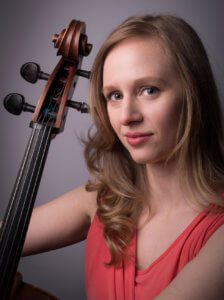
Caleigh Drane is an innovative and versatile cellist. She has recorded on Sony Classical and has performed, recorded, and collaborated with nearly 100 artists spanning all genres including some of today’s top pop and rock stars like Imogen Heap, John Cale, The Jonas Brothers, and Ra Ra Riot. She is also a passionate advocate and performer of new music. She maintains an active schedule as a soloist, chamber musician, recording artist, and music educator.
You can find out more about her on her website: http://www.caleighdrane.com/
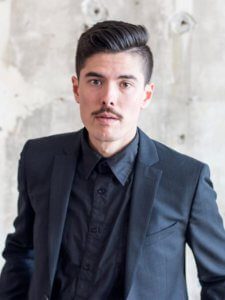
William Seiji Marsh is a guitarist, educator, coach and the founder of Musical Being. He has taught guitar at Willamette University and Reed College, and has maintained a private guitar studio for over 12 years. He has toured internationally and recorded with Pink Martini, Cherry Poppin’ Daddies, Halie Loren, Lost Lander, and many others. William founded Musical Being in 2020 to support musicians in building the life in music that they choose, regardless of the circumstances.
You can find out more about his project at https://musicalbeing.com
